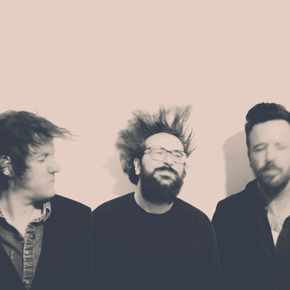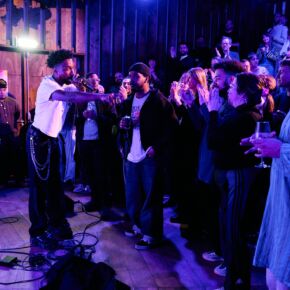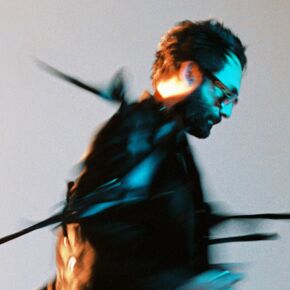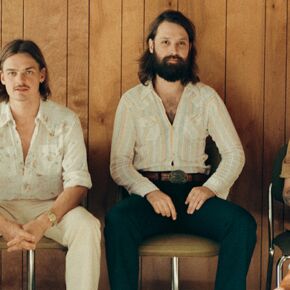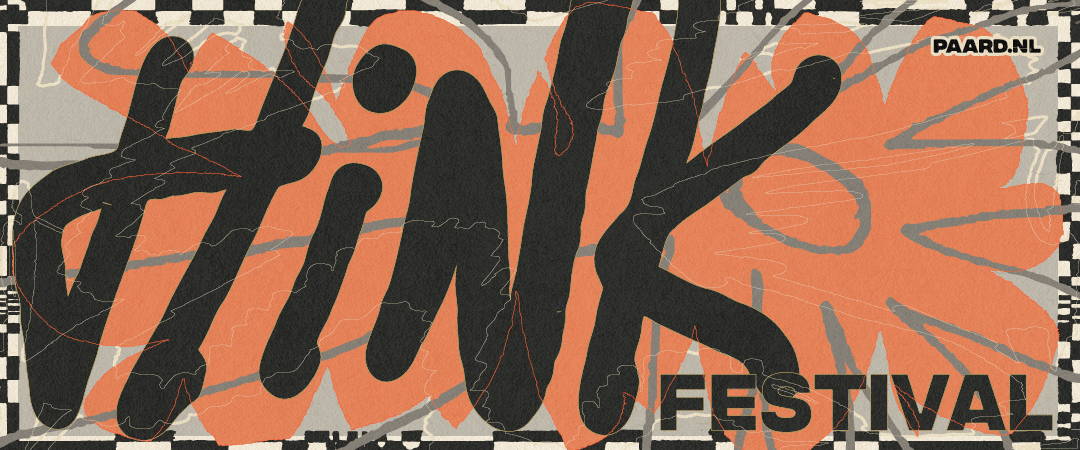
HINK FESTIVAL 2024
Alternative Folk
Sunday 8 december 2024
HINK is a festival that chooses a current angle with each edition. For instance, last year’s line-up highlighted the post-punk movement and this year’s special focus is on artists who, following the lead of acts such as LANKUM and Lisa O’Neill, add folk and roots to exciting alternative music. PAARD’s Grote Zaal will be transformed into an unconsecrated temple for the occasion, featuring specially designed performances by De Mannen Broeders (Brother Dieleman and Amen Ra singer Colin van Eekhout), English actress/musician Keeley Forsyth and the also English singer/writer/radio producer/activist Sam Lee. With nine more performances in the other venues in and around PAARD, HINK offers an adventurous Sunday trip through the alternative folk forest.
Artwork by Glitterstudio
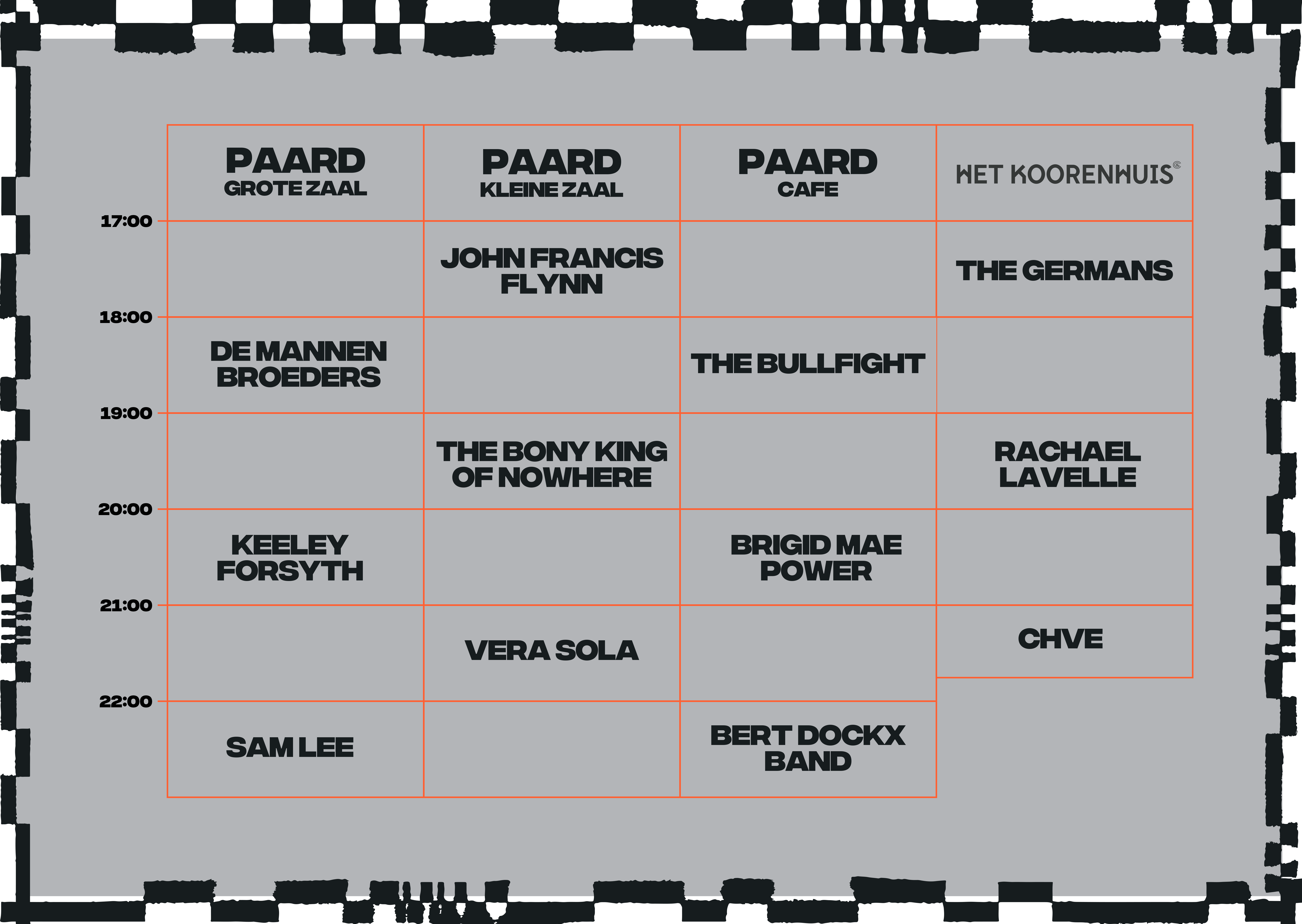
-
Programmer Henk Koolen on HINK
Why did HINK choose a seemingly traditional and uninnovative theme like folk music this year?
Folk music, with its roots in traditional songs and stories, has long served as fertile ground for new musical experiments. A new generation of artists is returning to this rich tradition, while simultaneously adding their own innovative layers to it.
The new wave of artists using folk as a source of inspiration proves that by integrating sometimes centuries-old elements, they can provide commentary on the present day. Bands like LANKUM and ØXN, for example, use folk music, but by mixing it with rock, ambient, and avant-garde noise, they create a genre we haven’t heard before.
Lyrically, interesting developments also emerge based on sometimes ancient texts. By reversing genders in old love stories, they comment on contemporary gender relations. Sociologist Roy Bailey and musician Sophie Crawford are researching Queer Folk: old folk songs that feature gender fluidity. There are more of these songs than you might initially expect. Sometimes these songs are humorous, but just as often, they have a mystical quality.
Traditional folk songs about topics like masters and servants can be used to comment on modern society, where the ‘haves’ and ‘have-nots’ still don’t have equal opportunities. This is part of a dynamic process that fits into the history of folk music—a genre largely passed down orally, constantly adapting to the spirit of the times and current events.
At HINK 2024, twelve acts will provide an overview of how traditional forms are integrated into new and innovative music.
Artists like De Mannen Broeders, Keeley Forsyth, Sam Lee, John Francis Flynn, The Bony King Of Nowhere, Vera Sola, The Bullfight, Brigid Mae Power, Bert Dockx, Colin H. van Eeckhout, The Germans, and Rachael Lavelle are stylistically very diverse, but they all use their love for traditional music as a starting point. Although they come from different countries (the Netherlands, Belgium, England, and Ireland), they share a fascination with the stories, melodies, and rhythms of the past.
They all share an interest in exploring the boundaries of folk music and creating a more personal and intimate sound. Much of their music is introspective and melancholic, but there’s also room for humor and joy. They use both acoustic and electric instruments, and they’re not afraid to experiment with various recording techniques.
Some, like Sam Lee and John Francis Flynn, draw from the British folk tradition, while others, like The Bullfight and The Germans, take a more experimental approach. Keeley Forsyth and Vera Sola combine folk with elements of art pop and drone, while Brigid Mae Power and Rachael Lavelle enrich the Irish folk tradition with their own unique voices.
-
Vera Sola
The American-Canadian singer-songwriter Vera Sola is a multi-instrumentalist. In addition to her powerful singing voice, she plays several instruments, including guitar, piano, synths, and organ, and she produces her own music.
Her musical influences are diverse, ranging from classical music to contemporary indie. In interviews, she has often cited artists like Leonard Cohen, Nancy Sinatra, and PJ Harvey as sources of inspiration. These influences are clearly audible in her songs, which are both melancholic and uplifting.
Vera Sola’s lyrics are often personal and introspective. They deal with love, loss, identity, and the search for oneself. In interviews, she said: “My music is a way for me to process my feelings and to connect with others. I hope that my songs comfort and inspire people.” She added, “I want to make music that touches people on a deep level. I want my music to make people think and for them to learn something from it.”
So far, Vera Sola has released two studio albums: Shades (2018) and this year’s Peacemaker. Both albums were highly praised. Pitchfork described Shades as “an intimate and melancholic masterpiece,” while Allmusic described Peacemaker as: “Vera Sola’s blurring of past and present sounds especially apt to the early 2020s here, but more often, Peacemaker‘s dreamlike world has a timeless appeal that fans of Calexico, Timber Timbre, and Marissa Nadler will love.”
Her performances are intense and full of emotion, and as the daughter of actor Dan Aykroyd, she takes on various characters. She says of this: “When I’m on stage, I let go of this person you’re talking to and let in whatever comes in, I take on different characters and slip into different feelings and spirits.”
-
SAM LEE
Sam Lee is a Singer, Storyteller, Activist, and Preserver of Traditional Music. With his unique voice and passion for the past, Sam Lee brings old melodies to life, giving them new relevance.
Lee’s music is a blend of traditional English folk songs and contemporary arrangements. He is a master at reinterpreting old ballads and translating them into a language that resonates with a modern audience. His debut album, *Ground of Its Own*, was nominated for the Mercury Prize. In an interview with *The Guardian*, Lee discussed his approach: “I’m not trying to be authentic; I’m trying to be authentic to myself and my interpretation of these songs.”
Lee’s musical roots lie in the English folk tradition of artists like Martin Carthy, Nic Jones, and The Watersons. However, he doesn’t limit himself to this genre alone. He incorporates elements from classical music and modern electronics, while also drawing influences from world music and sounds of nature.
Sam Lee’s lyrics are often infused with melancholy and a deep respect for nature. He sings about loss, mourning, and the beauty of life. In songs like “The Unquiet Grave” and “The Cruel Mother,” he explores dark themes such as death and betrayal, while also celebrating the strength of the human spirit and the connection to nature.
Lee has collaborated with a wide range of artists, from folk musicians to classical performers. He has performed with the London Symphony Orchestra and has developed a special bond with Scottish folk singer Jeannie Robertson.
Beyond his music career, Sam Lee is a passionate environmentalist. He uses his music as a platform to raise awareness about the climate crisis and the importance of biodiversity. His project *The Gathering* brings people together to sing and share stories about nature.
His latest album, *Songdreaming*, was highly praised earlier this year. *The Guardian*, for instance, awarded it the maximum score: “Romantic love and awe of nature prove inseparable: ‘Be soft like green moss, be free,’ urges Lee. The record’s dreamlike atmosphere is seductive and disquieting; a moving tribute to Albion’s troubled soul.”
-
Keeley Forsyth
Keeley Forsyth is an artist who evokes an intense, emotional world with her voice and music. Her body of work, which includes albums such as Debris, Limbs, and The Hollow, is a mix of folk, experimental pop, and soundscapes that are both comforting and unsettling.
Forsyth’s voice is her most striking feature. Deep, rich, and full of expression, she uses her voice as an instrument. In an interview with The Quietus, she described her voice as “a kind of organ that I’m still discovering.”
Forsyth’s lyrics are often personal and introspective, exploring themes such as loss, longing, and the complexity of human relationships. Her music shows influences from artists like PJ Harvey, Nick Cave, and Scott Walker.
A strong example of this is the song “Debris” from her debut album of the same name. In this track, Forsyth processes a period of personal change, using her voice to convey the emotional turmoil that comes with it.
Pitchfork described it as follows: “She sings with her whole chest: diaphragm tightening, air filling the lungs, muscles twisting up the length of her throat, unleashing a presence that drips with the blood of the flesh that produced it. Some singers try to make their art sound effortless; Forsyth emphasizes the physical strain.”
Forsyth has collaborated with various musicians and producers, including Colin Stetson and Ben Vince, who have also worked with artists such as Burial and Four Tet.
This past April, she performed at Rewire in the Grote Kerk.
-
De Mannen Broeders
De Mannen Broeders is a captivating musical project born from the collaboration between Dutch artist Broeder Dieleman and Flemish musician Colin van Eeckhout. Their music is a unique blend of folk, spoken word, and experimental soundscapes.
What makes De Mannen Broeders so special is the surprising combination of the two musicians. Broeder Dieleman is known for his distinctive Zeeland folk music, where he merges traditional instruments and vocals with modern elements. Colin van Eeckhout, the frontman of the post-metal band Amenra, brings a darker, more intense sound to the project.
Their debut album, Sober Maal, is an impressive example of this unique collaboration. Recorded in an 18th-century Mennonite Church, the album exudes an atmosphere of calm and reflection. The lyrics, mostly in Dutch, are personal and poetic, addressing themes like faith, loss, and the transience of life.
The music of De Mannen Broeders is a search for meaning in a complex world. The songs are meditative and invite the listener to pause and reflect on life’s big questions—particularly those concerning death.
-
Bony King Of Nowhere
Bram Vanparys, known under his alter ego The Bony King Of Nowhere, creates an intriguing mix of folk, indie, and Americana, characterized by personal lyrics and a melancholic atmosphere.
Vanparys’ musical journey began years ago with his well-received debut album. With each new release, from the award-winning Silent Days to the recent Everybody Knows, he has refined his style and explored more complex musical themes.
“I’m always looking for new challenges, new ways to express myself,” Vanparys said in an interview with Dansende Beren. “Making music is a way for me to grow, both as an artist and as a person.”
His most recent album, Everybody Knows, reflects on modern society, marked by social media, the pressure for success, and the search for identity. In songs like “Are You Still Alive” and “Everybody Knows,” he critiques the superficial nature of the modern world and advocates for more authenticity.
“Everything nowadays is about advertising and self-optimization,” Vanparys said. “I try to offer a counterbalance to that trend with my music.”
Vanparys’ musical influences are diverse, ranging from American singer-songwriters like Leonard Cohen and Nick Drake to Belgian bands like dEUS and Gorki.
In tracks like “The Weight of the World” from Silent Days, Vanparys highlights the burdens we carry in life, while in “The River” from Everybody Knows, he uses the river as a metaphor for the flow of life.
“I want my music to resonate with people, to stir something within them,” Vanparys said. “If I can achieve that, then I’m already very happy.”
-
John Francis Flynn
Irish singer-songwriter and multi-instrumentalist John Francis Flynn bridges the gap between traditional Irish music and modern genres like post-punk and electronica in his work.
Flynn began his musical career as a member of the traditional Irish folk band Skipper’s Alley. His solo debut, I Would Not Live Always (2021), was widely praised by critics and audiences alike, and was named Folk Album of the Year by The Guardian. With his second album, Look Over the Wall, See the Sky (2023), he continued his exploration of Irish folklore and the distinctive sound of Dublin.
Flynn’s music is a melting pot of different influences. While his roots lie in traditional Irish music, he also draws inspiration from genres like post-punk, electronica, and improvisational music. In an interview with The Wire, he described his music as “a kind of collage of different elements that come together to form something new.” In The Guardian, Flynn said, “I don’t want to modernize traditional music, but I do want to find new ways to listen to it.”
Flynn’s lyrics are often personal and introspective, but they are also deeply connected to Irish history and culture. He explores themes like identity, loss, and the relationship between humans and nature. In the song “Mole in the Ground” from his second album, for example, he weaves Irish mythology and personal experiences into a meditation on the cycle of life.
-
CHVE
CHVE is the dark folk solo project of Colin H. van Eeckhout, the frontman of the Belgian post-metal band Amenra.
Although both projects stem from the same musician, they bear little resemblance to each other. While Amenra is known for its heavy, intensely emotional post-metal sound, CHVE offers a much more intimate and acoustic experience. The music of CHVE is characterized by the use of the hurdy-gurdy, which creates a hypnotic atmosphere, drones that convey a sense of space and depth, and a minimalist approach. Unlike the often complex structures of Amenra, CHVE’s music is minimalistic and repetitive, allowing the listener to fully immerse themselves in the sounds and the more spoken-than-sung French-language lyrics.
-
Rachael Lavelle
Rachael Lavelle is a singer-songwriter from Dublin who initially studied sociology and Italian at Trinity College Dublin, but her passion for music quickly took over. After completing a master’s in music and media technology, she fully dedicated herself to her musical career. Her debut album, Big Dreams (2019), which spans a wide range of styles from intimate ballads to experimental electronics, was enthusiastically received by both critics and audiences, and was one of the nominations for Album of the Year in Ireland.
Lavelle draws inspiration from classical music, jazz, folk, and electronic genres. While her music is often compared to artists like Björk, Kate Bush, and Regina Spektor, she has developed her own unmistakable sound.
She has collaborated with a wide range of artists and ensembles, including Villagers, Crash Ensemble, Peter Broderick, Glasshouse, SlapBang, and Saint Sister. Lavelle is also known for her work with the Irish folk band LANKUM, for whom she performed as a support act.
-
The Germans
The post-punk avant-garde band The Germans is one of the most fascinating contemporary Belgian acts.
The band consists of five musicians: Jakob Ampe (vocals, guitar, synths), Vincent Cauwels (guitar, backing vocals), Lennert Jacobs (drums, synths), Timothy Jacobs (bass), and Boris Zeebroek (synths, bongos), also known as Bolis Pupil.
The Germans’ musical influences range from krautrock and classic post-punk bands like Joy Division and Talking Heads to indie-rock acts such as Interpol and Arctic Monkeys.
A notable feature of The Germans’ music is the length of their songs. Many tracks exceed five minutes, allowing for extended instrumental passages and complex song structures. In an interview with [magazine name], Jakob Ampe shared: “We don’t want to be confined by traditional song structures. We want to take the listener on a musical journey.”
Their discography now includes six albums, with the most recent, Spirituality, released earlier this year. It follows the 2019 album Sexuality, about which Indiestyle wrote: “It has to be said, with Sexuality, The Germans have added a crown jewel to their repertoire. The album consists of only nine tracks, but it showcases a wealth of unusual and marvelous productions. We must also mention that The Germans are, at heart, a live band that truly shines on stage. So we eagerly await the day we can see them perform live.”
And on December 8th, that will be possible!
-
Bert Dockx Band
Bert Dockx, born in 1980, is a highly active Belgian musician who has played in various bands and projects.
Dockx began his career at the Jazz Studio and the Royal Conservatory in Brussels. In 2008, he founded Flying Horseman, a band that quickly gained recognition for their energetic live performances and atmospheric music. In 2013, the band was nominated for two Music Industry Awards.
In addition to Flying Horseman, Dockx is also involved in other bands such as Dans Dans, Ottla, and Sweet Defeat. In these different projects, he continually explores new musical territories.
Following the success of his solo album Transit, he released Safe in 2017, an album that Dockx himself described as “navigating between threat and dream, between silence and storm.” In an interview, Dockx spoke about the personal significance of this album: “With Safe, I wanted to make myself vulnerable and confront my own demons.”
His influences are diverse, ranging from jazz guitarists like John McLaughlin and Pat Metheny to singer-songwriters like Leonard Cohen and Nick Drake. He explores the intersections of avant-garde rock, narrative blues, and instrumental jazz.
In his lyrics, he weaves personal stories with universal themes such as love, loss, identity, and the search for meaning. In songs like “Ghost” from his album Ghosts, he delves into the complexities of grief and loss.
-
Brigid Mae Power
Irish singer-songwriter Brigid Mae Power began her musical career under the name Brigid Power-Ryce, releasing her debut EP You Are Here in 2010. Since then, she has built an impressive discography, with albums such as Ode to an Emryo (2011), Eee Tuts (2013), and her most recent work, Dream From The Deep Well (2023). Each album marks a new phase in her artistic development, as she increasingly diverges from traditional folk to develop a more personal sound.
Power describes her music as a “mingling of old and new elements.” Her musical roots lie in Irish traditional music, but she also draws inspiration from various other genres, including pop, indie, and classical music. This broad palette is reflected in her music, often characterized by rich arrangements featuring strings, brass, and mellotron.
The lyrics of Power’s songs are frequently inspired by her own life and experiences. In Dream From The Deep Well, for example, she explores themes of family, love, loss, and the passage of time: “I’m dreaming of a time when I was young and free, and I could run through fields of gold.”
The melancholy in her music was described by Konstantin N. Rega from Spectrum Culture as: “The sense of a summer sun sinking shimmers throughout. There is beauty and sadness here.”
-
The Bullfight
The Bullfight, the Rotterdam-based band led by the versatile Thomas van der Vliet, has evolved into one of the most intriguing and adventurous acts in the Dutch music scene. With their mix of pop noir and experimental elements, they have carved out a distinctive sound.
Van der Vliet began his musical career in the early 2000s, and with his band, he released their debut album One Was a Snake in 2006, followed by Stranger Was the Night in 2010 and La Chasse in 2013. These albums are characterized by dark, melancholic melodies and poetic lyrics. In an interview with 3voor12 Rotterdam, Van der Vliet described his music as “a kind of soundtrack for a film that hasn’t been made yet.”
Critics have hailed their albums as “growth diamonds” (Beauforthuis) and “a magnum opus” (Muziscene). The lyrics, often penned by vocalist Nick Verhoeven, have been praised for their poetic quality and the intense emotions they convey.
In 2024, The Bullfight released Het Interview, a unique project that encompasses a novel, a soundtrack, and a series of linocuts by French artist Hélène Bautista. In this project, Van der Vliet blends his love for music, literature, and visual arts.
An artist unbound by genre and disciplinary boundaries, Van der Vliet spoke to Popunie Rotterdam about his desire to explore new avenues: “I don’t want to keep making the same thing. I want to keep evolving as a musician and as a person.”
The lyrics of The Bullfight often delve into introspective themes such as love, loss, identity, and the quest for meaning. In the song Amen, Demon from the album Het Interview, vocalist Daisy Cools sings about the struggle between good and evil—a recurring theme in the band’s music.
The Bullfight draws influences from a wide range of genres, from classic rock and blues to modern electronic music. Van der Vliet cites bands like Nick Cave and the Bad Seeds, Leonard Cohen, and Radiohead as significant sources of inspiration.
